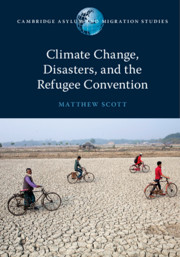Book contents
- Climate Change, Disasters, and the Refugee Convention
- Cambridge Asylum and Migration Studies
- Climate Change, Disasters, and the Refugee Convention
- Copyright page
- Contents
- Figures
- Series Editor’s Preface
- Acknowledgements
- Note on the Text
- Table of Cases
- Table of Treaties and Other International and Regional Instruments
- Abbreviations
- 1 Introduction
- 2 Two Disaster Paradigms
- 3 Jurisprudence on the Determination of Refugee Status in the Context of ‘Natural’ Disasters and Climate Change
- 4 Interpreting the Refugee Definition
- 5 The Temporal Scope of Being Persecuted
- 6 The Personal Scope of Being Persecuted: The Function of the Non-discrimination Norm within the Refugee Definition
- 7 Refugee Status Determination in the Context of ‘Natural’ Disasters and Climate Change
- Appendix: Taxonomy
- Bibliography
- Index
5 - The Temporal Scope of Being Persecuted
Published online by Cambridge University Press: 18 January 2020
- Climate Change, Disasters, and the Refugee Convention
- Cambridge Asylum and Migration Studies
- Climate Change, Disasters, and the Refugee Convention
- Copyright page
- Contents
- Figures
- Series Editor’s Preface
- Acknowledgements
- Note on the Text
- Table of Cases
- Table of Treaties and Other International and Regional Instruments
- Abbreviations
- 1 Introduction
- 2 Two Disaster Paradigms
- 3 Jurisprudence on the Determination of Refugee Status in the Context of ‘Natural’ Disasters and Climate Change
- 4 Interpreting the Refugee Definition
- 5 The Temporal Scope of Being Persecuted
- 6 The Personal Scope of Being Persecuted: The Function of the Non-discrimination Norm within the Refugee Definition
- 7 Refugee Status Determination in the Context of ‘Natural’ Disasters and Climate Change
- Appendix: Taxonomy
- Bibliography
- Index
Summary
In this chapter, the first limitation identified in the human rights-based approach is considered. The chapter develops the argument that the dominant human rights-based approach reflects an 'event paradigm' that only recognises that a person is persecuted once she has become the victim of a serious denial of human rights. From this perspective, persecution is equivalent to the kinds of harm recognised by international human rights law, such as being tortured. It therefore follows that the well-founded fear criterion has come to be seen as introducing a criterion of risk assessment, determining how likely it is that 'persecution' might happen on return. This perspective casts the temporal scope of being persecuted too narrowly, and, using the methodology set out at Articles 31-33 of the Vienna Convention on the Law of Treaties, the argument is advanced that a person can accurately be described as being persecuted before being subjected to a serious denial of human rights, and that the risk of being exposed to such harm is inherent in the predicament of being persecuted. Rather than being an event, being persecuted is better understood as a condition of existence.
Keywords
- Type
- Chapter
- Information
- Climate Change, Disasters, and the Refugee Convention , pp. 96 - 111Publisher: Cambridge University PressPrint publication year: 2020

